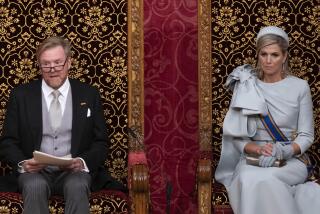Pope Proposes International Ban on Apartheid
- Share via
THE HAGUE — Still besieged by religious critics in the tempestuously liberal Netherlands, Pope John Paul II reaffirmed his religious conservativism Monday and also outlined for the World Court his ideas for an international rule of law that would ban apartheid in any guise.
The streets that the pontiff traversed in The Hague and Utrecht on the third day of his pastoral visit to the Netherlands were again plagued by demonstrators who opposed him, but there was no repeat of the violence that broke out on Sunday in Utrecht.
Instead, small groups of activists demonstrated peacefully in favor of abortion, world peace and feminism while roving bands of punk-style youths cursed him and made obscene gestures. One young man tried unsuccessfully in The Hague to hit the papal limousine with a bottle of gin.
John Paul was again chided, both by loyal Roman Catholics and by leading Dutch Protestants, for his firmly disapproving stands on some of the issues that have divided the faithful in Holland.
In a talk that sounded more like a lecture on church history than a welcome to The Hague, Netherlands Prime Minister Ruud Lubbers, a Catholic, pointedly reminded the Pope of this country’s traditional independence and diversity of opinion.
‘Rome Seems Far Away’
“Sometimes Rome seems a very long way from here,” Lubbers said. “Indeed, to be quite frank, simply the word Rome makes some people uneasy if not downright suspicious.”
Later in the day, the head of the Dutch Reformed Church directly challenged the pontiff during an ecumenical meeting on issues--such as the role of women in the church--that separate the Vatican from many Catholics and most Protestants here. Although John Paul had prepared a firmly negative reply that the Vatican distributed as an official statement of his views, he omitted key passages relating to several controversial issues when he spoke to the ecumenical group.
But in a major address to the International Court of Justice, known informally as the World Court, which is situated in The Hague, the Pope eloquently outlined his vision of what an effective system of international law should be. Among other things, he said, it must include a worldwide bill of human rights.
“The right to life of every individual, the right to a decent existence worthy of human beings and the right to protection by the law, recognition of the right of peoples to self-determination and independence and their right to a fair share of the world’s economic wealth” must underlie international law, he said.
The system must also include “a wider acceptance of the so-called compulsory jurisdiction of the court,” the Pope said in what some observers interpreted as a mild rebuke to the Reagan Administration, which has refused to acknowledge the court’s jurisdiction in a case involving a complaint against the United States by Nicaragua.
No Discrimination
The Pope said “no form of discrimination--in law or in fact--on the basis of race, origin, color, culture, sex or religion can ever be acceptable. Hence no system of apartheid or separate development will ever be acceptable as a model for the relations between peoples or races.”
Although John Paul has often condemned South Africa’s apartheid system of racial segregation and discrimination, he has not mentioned the subject recently and was under pressure both from within the church and from visitors at the Vatican, such as the Rev. Jesse Jackson, to do so.
In his meeting in Utrecht with non-Catholic religious leaders and members of the ecumenical movement, the pontiff faced direct confrontation on religious matters.
The Rev. Henk Huting, chairman of the Dutch Reformed Church, criticized traditional Roman Catholic attitudes towards religiously mixed marriages, sharing the sacrament of the Eucharist (communion) with non-Catholics, the role of women in the church and what he perceived to be an official cooling of ecumenical contacts.
In his prepared remarks to Huting’s challenge, John Paul diplomatically but firmly refused to budge from longstanding Roman Catholic positions. On mixed-faith marriages, he said, “The Catholic partner is called to be loyal to the tradition of his or her faith, to live it and to hand it on (to their children.)”
Sharing Communion
On the question of sharing communion with non-Catholic Christians, he answered with a question of his own: “Would difficulties really disappear if, in spite of persisting divisions in faith, Christians of different churches were admitted to full communion in the celebration of the Eucharist or the Lord’s Supper?”
As for women’s role in the church, his text said, “The Catholic Church feels constrained by her faithfulness to the word of God, as she understands it in the example of the Lord, the witness of Holy Scripture and the tradition of nearly 2,000 years, to exclude the ordination of women to the ministry of the priesthood. . . .
“But this position is not meant to exclude women from the life of the church. . . . It would be sad indeed if the particular issue of ordination were to blind us to so much that is positive. . . . “
Although the pontiff deleted these key portions of his reply when he delivered the speech, the bishop of Breda, Msgr. Hubert Ernst, explained that John Paul skipped those parts only to save time and meant the replies as shown in his text to be accepted as his official words.
To Huting’s complaint of a diminishing interest in ecumenism and interfaith dialogue, John Paul insisted in both his prepared and delivered text that the Roman Catholic Church remains “irrevocably committed” to the ecumenical movement.
More to Read
Sign up for Essential California
The most important California stories and recommendations in your inbox every morning.
You may occasionally receive promotional content from the Los Angeles Times.













